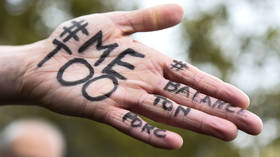#MeToo setback: French court finds assault accuser guilty of defamation

French author Ariane Fornia has been found guilty of defamation, after a former government minister challenged her claim of sexual assault. The verdict is another blow for the #MeToo movement in France.
A Paris court ordered Fornia, the daughter of former minister Eric Besson, to pay a symbolic one euro in damages and 3,000 euros in legal fees to Pierre Joxe, a former socialist minister who Fornia defamed with an allegation of sexual assault.
In 2017, Fornia accused Joxe – now 85 – of sexually assaulting her during an opera performance in Paris seven years earlier. She did not make an official complaint, but wrote about the encounter in a blog post, describing how “He slides his hand inside my thigh, goes up to my crotch...I utter a cry of muffled indignation. Ten minutes later, he starts again.”
Poursuivie en diffamation par Pierre Joxe, Ariane Fornia fixée sur son sort ce mercredi #Sociétéhttps://t.co/3t0H8LPODP
— Le Figaro (@Le_Figaro) January 22, 2020
Fornia’s accusation made national news, coming at the height of the MeToo movement. The same year, the New York Times reported that more than a dozen women accused film mogul Harvey Weinstein of assault, harassment and rape, and the hashtag #MeToo became a rallying call for a national outcry against similar stories of male misbehaviour, from the benign to the illegal and morally repugnant.
Joxe has been accused of sexual impropriety by more than one woman, but outright denies all the charges. He mounted the case against Fornia in 2018, after the author refused to retract her accusation and issue him an apology.
Also on rt.com As Harvey Weinstein trial begins, Hollywood dutifully feigns the outrage it kept quiet for the years he operatedThe court’s decision is the latest blow for the MeToo movement in France, where it is more commonly referred to as the ‘#BalanceTonPorc’ or ‘Rat on your Pig’ campaign. The campaign’s French originator, Sandra Muller, was found guilty of defamation in September, when a court ordered her to pay €15,000 euros in damages and another €5,000 in legal fees to a television executive she claimed sexually harassed her at a cocktail party in 2012.
The executive, Eric Brion, admitted that he had come on to Muller at the party, but outright denied the charge of harassment and said he backed off when he realized Muller was uninterested in his advances. His lawyers told the court that he had simply exercised “his right to flirt.”
The Muller case threw the MeToo campaign into an unflattering spotlight in France. In an open letter published in the newspaper Le Monde, a hundred prominent French women, including actress Catherine Deneuve, called its supporters “puritans,” and argued that prosecuting men for minor indiscretions robs them of their “indispensable freedom” to play the game of seduction.
Also on rt.com French #MeToo trial shows there is no winner in the battle of the sexesThe movement has not been criticized in the US as extensively as it has in France. As Deneuve’s letter made front-page news in France, actress and Weinstein accuser Asia Argento claimed that its authors had been “lobotomized” by their “interiorized misogyny.”
Later that year in Washington, multiple unfounded accounts of sexual assault would be used by politicians, pundits and celebrities in an attempt to derail the confirmation of Supreme Court Justice Brett Kavanaugh.
Think your friends would be interested? Share this story!














